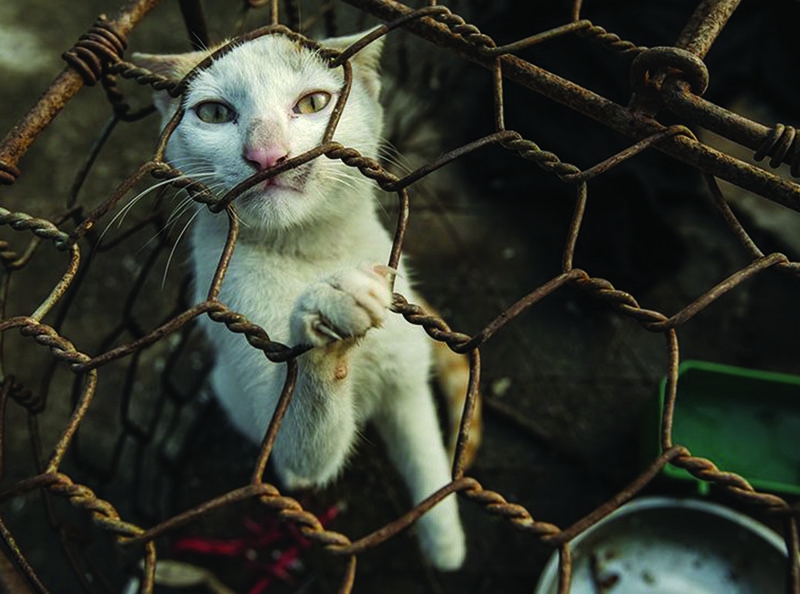Prohibiting the slaughter of dogs and cats
 |
| Prohibiting the slaughter of dogs and cats |
The rampant trade in dog and cat meat in Vietnam causes the suffering of millions of animals each year, many of which are stolen pets. In recent years, while the dog meat trade has received the attention of domestic and international animal protection organisations and media outlets, cats also remain victims of a brutal and cruel business form.
Although there are no specific regulations on banning the slaughter and trade of dog and cat meat in Vietnam, authorities in major cities such as Hanoi and Ho Chi Minh City have called on people to give up the habit of consuming it. However, persuading people to change such habits remains a challenge.
In 2018, the People’s Committee of Hanoi issued a document calling for people to stop eating dog and cat meat so as not to affect the “image of a modern, civilised capital”. In addition to increased risk of disease transmission, Hanoian leaders also said that the issue caused “objections from tourists and international visitors living or working in Hanoi”.
The following year, the Food Safety Management Authority of Ho Chi Minh City also recommended that people do not eat dog meat due to health risks such as carrying the virus that causes rabies and the possibility of infection with parasites due to not being quarantined.
While dog meat is not banned (although it is not included in the list of domestic animals for human consumption), hunting, slaughtering, and consuming cats was banned in Vietnam in 1998.
Facing the risk of rapidly growing rats causing damage to crops and potentially causing the plague, the government issued Directive No.09/1998/CT-TTg on eliminating rats to protect crops in the form of revoking business licenses, immediately terminating cat-meat eateries, and strictly dealing with those who hunt cats. After the directive was issued, the Ministry of Agriculture and Rural Development issued a circular guiding implementation of the directive at the provincial level. Just over a year ago, however, both the directive and the circular were cancelled.
Based on the regulations in effect at the present time, the act of killing dogs and cats for food is not prohibited in Vietnam, but the law also has strict regulations on the process of ensuring food safety and hygiene when slaughtering and consuming the meat, conditions for slaughterhouses, transportation of products, and more besides.
There is no country that officially legalises or controls the trade of dogs and cats for meat, and there is no government or organisation that devises ways to raise and slaughter dogs and cats in a humanitarian way.
However, more and more countries and territories in the region have banned the slaughter and trade of dogs and cats for meat based on the principles of animal rights protection, community health, and safety protection as well as for disease control.
Hong Kong was the first, issuing a dog and cat decree in 1950 that prohibited the slaughter of any individual dog or cat for meat. More recently, Taiwan’s lawmakers banned the trade in 2001 by amending the Animal Protection Act of 1993. This law illustrates dogs and cats as pets and prohibits the slaughter of pets for consumption for meat or butcher.
In 2017, a new law was born that removed the loophole of an earlier law that prohibited the slaughter of pets for meat, making Taiwan the third territory in Asia to do so, after Singapore and Hong Kong.
The following year, the US government passed a draft prohibiting the slaughter of dogs and cats for meat, which stipulates that slaughtering, transporting and trading of the animals will be fined up to $5,000 and possibly imprisoned for up to one year.
What the stars mean:
★ Poor ★ ★ Promising ★★★ Good ★★★★ Very good ★★★★★ Exceptional
 Tag:
Tag:
Related Contents
Latest News
More News
- Dong Ho folk painting added to UNESCO’s urgent safeguarding list (December 11, 2025 | 18:09)
- Conference focuses on switch from dog and cat meat trade to sustainable, safe jobs (December 11, 2025 | 12:13)
- 3F Plus clean pork amazes Michelin-starred chefs (December 09, 2025 | 12:15)
- The Rhythm of Blues – Colours of the Year 2026 (December 06, 2025 | 12:10)
- Pan Pacific Hanoi kicks off 2026 art awards celebrating young and disabled artists (November 06, 2025 | 18:25)
- PREP AI Language Fair 2025 highlights AI-powered language learning (November 03, 2025 | 09:00)
- Hanoi strengthens rabies control and supports transition of dog and cat meat trade (October 28, 2025 | 18:09)
- World-famous Gaia Earth installation touches down at UNIS Hanoi (October 07, 2025 | 13:40)
- Sidecar passion drives Vietnamese motor enthusiasts wild (September 05, 2025 | 09:00)
- Sheraton Saigon unveils artistic mooncake collection for 2025 (August 08, 2025 | 09:00)




















 Mobile Version
Mobile Version